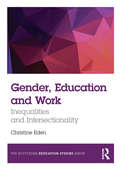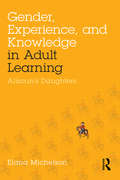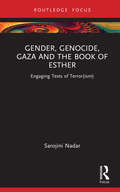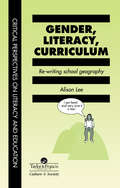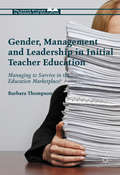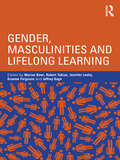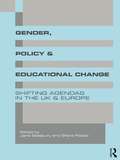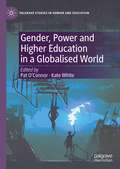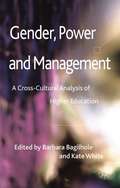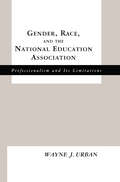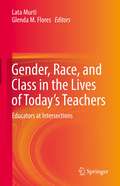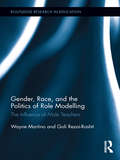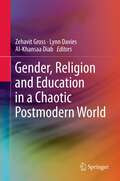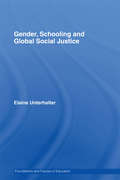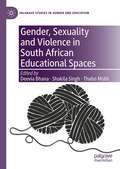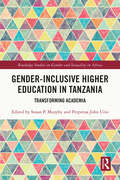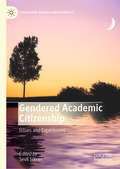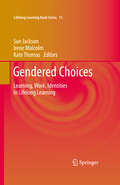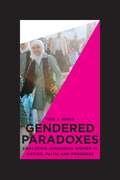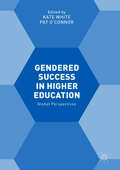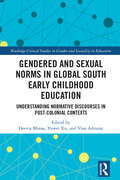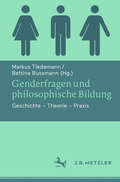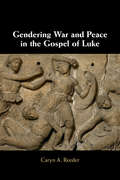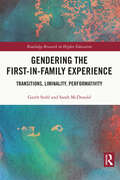- Table View
- List View
Gender, Education and Work: Inequalities and Intersectionality (The Routledge Education Studies Series)
by Christine EdenGirls outperform boys in educational achievement, yet women in work are less well paid, are underrepresented in positions of power and carry a disproportionate burden of care and childcare. Gender, Education and Work analyses and interprets the latest data and research in the field to offer detailed historical and sociological explanations for this continuing inequity, exploring different dimensions of inequality and how they intersect. With discussion questions and selected further reading to support reflection on your own understanding and assumptions, it covers key topics: Historical approaches to the education of girls and women Key theories and debates Patterns of achievement and intersectionality Attainment gaps and socio-economic status Ethnicity and attainment gaps Gender in the classroom and gender identity in schools Patterns of employment and the nature of work The gender pay gap Women’s experience of work Gender, Education and Work provides the arguments together with the historical evidence and research data required by serious education studies and sociology students engaged in the analysis of this urgent and complex topic.
Gender, Experience, and Knowledge in Adult Learning: Alisoun’s Daughters
by Elana MichelsonIn this wide-ranging book, Elana Michelson invites us to revisit basic understandings of the `experiential learner’. How does experience come to be seen as the basis of knowledge? How do gender, class, and race enter into the ways in which knowledge is valued? What political and cultural belief systems underlie such practices as the assessment of prior learning and the writing of life narratives? Drawing on a range of disciplines, from feminist theory and the politics of knowledge to literary criticism, Michelson argues that particular understandings of `experiential learning’ have been central to modern Western cultures and the power relationships that underlie them. Presented in four parts, this challenging and lively book asks educators of adults to think in new ways about their assumptions, theories, and practices: Part I provides readers with a short history of the notion of experiential learning. Part II brings the insights and concerns of feminist theory to bear on mainstream theories of experiential learning. Part III examines the assessment of prior experiential learning for academic credit and/or professional credentials. Part IV addresses a second pedagogical practice that is ubiquitous in adult learning, namely, the assigning of life narratives. Gender, Experience, and Knowledge in Adult Learning will be of value to scholars and graduate students exploring adult and experiential learning, as well as academics wishing to introduce students to a broad range of feminist, critical-race, materialist and postmodernist thinking in the field.
Gender, Genocide, Gaza and the Book of Esther: Engaging Texts of Terror(ism) (Rape Culture, Religion and the Bible)
by Sarojini NadarGender, Genocide, Gaza and the Book of Esther bridges the gap between gendered and geopolitical analyses by interrogating both the sexual and ethnic violence embedded in the Book of Esther. While much scholarship has examined the potential genocide of the Jews in the narrative, far less attention has been paid to the Persian “retaliation genocide.” Framed within decolonial feminist perspectives, this book shifts between the harem—the royal institution where women were sequestered for the king’s use—and herem, the practice of divinely sanctioned warfare that justifies the extermination of an enemy. Rather than operating as discrete forms of violence, the book argues that the harem and the herem are co-constitutive, revealing how gendered and ethnic domination function in tandem. Through a combination of narrative inquiry, inter-textual readings, critical discourse analysis, and theological assessments of both the biblical text and its contemporary reception, Gender, Genocide, Gaza and the Book of Esther invites interpreters to consider the larger frameworks of ethnicity and racialization within which hermeneutics of sexual violence take place. A close literary reading of Esther is paired with an analysis of its contemporary geopolitical appropriations, particularly its use in Christian Zionist rhetoric. The explicit invocation of the Amalekite extermination trope by Israel’s prime minister in October 2023 to justify attacks on Gaza, underscores the enduring political afterlives of texts of terror. This book contends that a feminist reading of Esther cannot limit itself to an analysis of sexual violence but must extend its critique intersectionally, engaging with the broader necropolitical economies that structure both ancient and modern deployments of biblical violence.
Gender, Literacy, Curriculum: Rewriting School Geography (Critical Perspectives On Literacy And Education Ser.)
by Alison LeeFirst Published in 1996. Routledge is an imprint of Taylor & Francis, an informa company.
Gender, Management and Leadership in Initial Teacher Education
by Barbara ThompsonThis book highlights the difficulties that women working as managers and leaders in initial teacher education face. Teacher education is at the forefront of education reforms and yet little is known about the professional lives of those who work within it. Whereas many women are moving into positions of authority in teacher training, some existing women managers are being marginalized within new internally differentiated layers of managerial structures. Yet other female managers, mainly new appointees, seem to endorse the discourses associated with new managerialist practices. Simultaneously some women who manage in teacher training are engaged in a struggle for survival individually and professionally. In the main, men seem to be missing from authority positions and will conclude that, in the current climate, the management of teacher training is 'no job for a man'.
Gender, Management and Leadership in Initial Teacher Education: Managing to Survive in the Education Marketplace? (Palgrave Studies in Gender and Education)
by Barbara ThompsonThis book highlights the difficulties that women working as managers and leaders in initial teacher education face. Teacher education is at the forefront of education reforms and yet little is known about the professional lives of those who work within it. Whereas many women are moving into positions of authority in teacher training, some existing women managers are being marginalized within new internally differentiated layers of managerial structures. Yet other female managers, mainly new appointees, seem to endorse the discourses associated with new managerialist practices. Simultaneously some women who manage in teacher training are engaged in a struggle for survival individually and professionally. In the main, men seem to be missing from authority positions and will conclude that, in the current climate, the management of teacher training is ‘no job for a man’.
Gender, Masculinities and Lifelong Learning
by Marion Bowl Robert Tobias Jennifer Leahy Graeme Ferguson Jeffrey GageGender, Masculinities and Lifelong Learning reflects on current debates and discourses around gender and education, in which some academics, practitioners and policy-makers have referred to a crisis of masculinity. This book explores questions such as: Are men under-represented in education? Are women outstripping men in terms of achievement? What evidence supports the view that men are becoming educationally disadvantaged? Drawing on research from a number of countries, including the UK, Australia, New Zealand and Canada, the contributors' discuss a range of issues which intersect with gender to impact on education, including structural factors such as class, ethnicity and age as well as colonisation and migration. The book provides evidence and argument to illuminate contemporary debates about the involvement of men and women in education, including: The impact of colonisation on the gendering of education and lifelong learning International surveys on men, women and educational participation Gender, masculinities and migrants’ learning experiences Boys-only classes as a response to ‘the problem of underachieving boys’ Men’s perspectives on learning to become parents Community learning, gender and public policy Older men’s perspectives on (re-)entering post-compulsory education The book goes on to suggest the implications for practice, research and policy. Importantly, it critically addresses some of the taken-for-granted beliefs about men and their engagement in lifelong learning, presenting new evidence to demonstrate the complexity of gender and education today. With these complexities in mind, the authors provide a framework for developing further understanding of the issues involved with gender and lifelong learning. Gender, Masculinities and Lifelong Learning will be of interest to any practitioner open to fresh ideas and approaches in teaching and programming connected with gender and education.
Gender, Policy and Educational Change: Shifting Agendas in the UK and Europe
by Sheila Riddell Jane SalisburyGender equality has been a major educational theme for the past two decades and has become interwoven with other policy themes, including those of marketisation and managerialism. Contributors to this strong collection are key researchers in their fields and seek to address the following questions:* What patterns are discernible in the educational attainment of girls and boys over the past two decades?* To what extent are changes attributable to gender equality policies?* What form have gender equality policies taken in different parts of the UK?* What has been the impact of European equality policies?* How have gender equality policies been experienced by particular groups including pupils from ethnic minority and working-class backgrounds?This book aims to take an overall look at how significant have been the changes in experiences, aspirations and culture of girls and boys and male and female teachers. It explores how attempts to improve equal opportunities in education have fared and examines the tensions and contradications in recent policies.
Gender, Power and Higher Education in a Globalised World (Palgrave Studies in Gender and Education)
by Kate White Pat O’ConnorThis book examines persistent gender inequality in higher education, and asks what is preventing change from occurring. The editors and contributors argue that organizational resistance to gender equality is the key explanation; reflected in the endorsement of discourses such as excellence, choice, distorted intersectionality, revitalized biological essentialism and gender neutrality. These discourses implicitly and explicitly depict the status quo as appropriate, reasonable and fair: ultimately impeding efforts and attempts to promote gender equality. Drawing on research from around the world, this book explores the limits and possibilities of challenging these harmful discourses, focusing on the state and universities themselves as levers for change. It stresses the importance of institutional transformation, the vital contribution of feminist activists and the importance of women’s deceptively ‘small victories’ in the academy.
Gender, Power and Management
by Kate White Barbara BagilholeWomen are now part of senior management in higher education (HE) to varying degrees in most countries and actively contribute to the vision and strategic direction of universities. This book attempts to analyse their impact and potential impact on both organisational growth and culture
Gender, Race and the National Education Association: Professionalism and its Limitations (Studies in the History of Education)
by Wayne J. UrbanUrban presents the NEA in its historical context, turning a fair and clear eye on this powerful and controversial organization, and using this context to both criticize and commend. The culmination of a three decade long study, this unique volume presents an unusually thorough and much needed holistic view of the NEA.
Gender, Race, and Class in the Lives of Today’s Teachers: Educators at Intersections
by Glenda M. Flores Lata MurtiThis volume explores the professional experiences of a vast array of educators through a series of research essays that focus on the interplay of gender, race, class, and sexualities as well as how these dynamics influence the educators’ teaching. The volume illuminates this interplay not only in traditional classroom settings, but also in non-traditional contexts such as prisons and juvenile detention facilities, family education, dual-language immersion programs, early childhood education, and higher education, including teacher training programs. The concluding chapter, written by the editors, provides general recommendations for recruiting and retaining a more diverse teacher workforce worldwide. From autoethnographies to pláticas, testimonios and in-depth interviews, this qualitatively rich volume offers powerful and timely insights about the experiences of teachers who are too often overlooked. Gilda L. Ochoa, Professor of Chicana/o Latina/o Studies This illuminating book centers educators’ intersectional subjectivities and lived experiences, bringing to life the radical possibilities of transformative education. It is a much needed resource for anyone invested in understanding and advancing education as a catalyst for equity and social justice. Lorena Garcia, Associate Professor of Sociology & Latin American and Latino Studies
Gender, Race, and the Politics of Role Modelling: The Influence of Male Teachers (Routledge Research in Education)
by Wayne Martino Goli Rezai-RashtiThis book provides an illuminating account of teachers’ own reflections on their experiences of teaching in urban schools. It was conceived as a direct response to policy-related and media-generated concerns about male teacher shortage and offers a critique of the call for more male role models in elementary schools to address important issues regarding gender, race and the politics of representation. By including the perspectives of minority teachers and students, and by drawing on feminist, queer and anti-racist frameworks, this book rejects the familiar tendency to resort to role modelling as a basis for explaining or addressing boys’ disaffection with schooling. Indeed, the authors argue, on the basis of their research in urban schools in Canada and Australia, that educational policy concerned with male teacher shortage and the plight of disadvantaged minority boys would benefit from engaging with analytic perspectives and empirical literature that takes readers beyond hegemonic discourses of role modelling. A compelling case is presented for the need to disarticulate discourses about role modelling from a politics of representation that is committed to addressing the reality of the impact of racial and structural inequalities on both minority teachers and students’ participation in the education system. The book also provides insight into the persistence of gender inequality as it relates to the status of elementary school teaching as women’s work.
Gender, Religion and Education in a Chaotic Postmodern World
by Lynn Davies Al-Khansaa Diab Zehavit GrossThe immense changes that the world is undergoing in terms of globalization and migration of peoples have had a profound effect on cultures and identities. The question is whether this means shifts in religious identities for women and men in different contexts, whether such shifts are seen as beneficial, negative or insufficient, or whether social change actually means new conservatisms or even fundamentalisms. Surrounding these questions is the role of education is in any change or new contradiction. This unique book enhances an interdisciplinary discourse about the complex intersections between gender, religion and education in the contemporary world. Literature in the social sciences and humanities have expanded our understanding of women's involvement in almost every aspect of life, yet the combined religious/educational aspect is still an under-studied and often under-theorized field of research. How people experience their religious identity in a new context or country is also a theme now needing more complex attention. Questions of the body, visibility and invisibility are receiving new treatments. This book fills these gaps. The book provides a strong comparative perspective, with 15 countries or contexts represented. The context of education and learning covers schools, higher education, non-formal education, religious institutions, adult literacy, curriculum and textbooks. Overall, the book reveals a great complexity and often contradiction in modern negotiations of religion and secularism by girls and boys, women and men, and a range of possibilities for change. It provides a theoretical and practical resource for researchers, religious and educational institutions, policy makers and teachers.
Gender, Schooling and Global Social Justice (Foundations and Futures of Education)
by Elaine UnterhalterTimely and original, this book examines gender equality in schooling as an aspiration of global social justice. With nearly one billion people having little or no schooling and women and girls comprising nearly two-thirds of this total, this book analyses the historical, sociological, political and philosophical issues involved as well as exploring actions taken by governments, Inter-Government Organisations, NGOs and women’s groups since 1990 to combat this injustice. Written by a recognised expert in this field, the book is organised clearly into three parts: the first provides a background to the history of the provision of schooling for girls worldwide since 1945 and locates the challenges of gender inequality in education the second examines different views as to why questions of gender and schooling should be addressed globally, contrasting arguments based on human capital theory, rights and capabilities the third analyses how governments, Inter-Government Organisations and NGOs have put policy into practice. Addressing the urgent global challenges in gender and schooling, this book calls for a new connected approach in policy and practice. It is essential reading for all those interested in education, along with developmental studies, sociology, politics and women’s studies.
Gender, Sexuality and Violence in South African Educational Spaces (Palgrave Studies in Gender and Education)
by Deevia Bhana Thabo Msibi Shakila SinghThe book focuses on the ways in which gendered and sexualised systems of power are produced in educational settings that are framed by broader social and cultural processes, both of which shape and are shaped by children and young people as they interact with each other. All these nuanced features of gender and sexuality are vital if we are to understand inequalities and violence, and fundamental to our three-ply yarn approach in this book. Focusing on the South African context, but with international relevance, the authors adopt the metaphor of the three-ply yarn (Jordan-Young, 2010): these being the cross-cutting themes of gender, sexuality and violence. Subsequently, the book illustrates the intimate ties that bind gender and sexuality with the social and cultural dimensions of violence, as experienced in educational settings.
Gender-Inclusive Higher Education in Tanzania: Transforming Academia (Routledge Studies on Gender and Sexuality in Africa)
by Susan P. Murphy Perpetua John UrioWhilst there is an extensive body of research exploring the barriers to gender equality and female empowerment in high-income states, there are far fewer systematic analyses within lower-income settings. This book draws on extensive empirical data to analyse gender mainstreaming and gender transformative actions in Tanzanian higher education.The book maps the practical landscape of gender mainstreaming across 14 universities in Tanzania, and the theoretical landscape of African theories of masculinities and femininities underpinning educational institutions and practices. It then assesses the Gender Awareness and Transformation through Education project, which was designed to support the development of gender expertise and capacities in research and education at one specific institution, across both its administrative and academic units. Current and future academics at Dar es Salaam University College of Education were trained in gender-based research and education, and a strategic plan was developed to guide in the establishment of a Gender Research Centre that will provide gender expertise in research and teaching to the College; and, over time, to other HEIs nationally and regionally. By bringing together real-world insights from action-based research, the book demonstrates the impact of real-time social change and gender transformation, with implications both for Tanzania and beyond.Bringing novel empirical insights and policy recommendations, this book will be of interest to researchers and policy makers across the fields of gender studies, education, and African studies.
Gendered Academic Citizenship: Issues and Experiences (Citizenship, Gender and Diversity)
by Sevil SümerThis book proposes the framework of gendered academic citizenship to capture the multidimensional and complex dynamics of power relations and everyday practices in the contemporary context of academic capitalism. The book proposes an innovative definition of academic citizenship as involving three key components: membership, recognition and belonging. Based on new empirical data, it identifies four ideal-types of academic citizenship: full, limited, transitional citizenship and non-citizenship. The different chapters of the book provide comprehensive reviews of the relevant research literature and offer original insights into the patterns of gender inequalities and practices of gendered academic citizenship across and within different national contexts. The book concludes by setting a comprehensive research agenda for the future. This book will be of interest to academic researchers and students at all levels in the disciplines of sociology, gender studies, higher education, political science and cultural anthropology.
Gendered Choices
by Kate Thomas Sue Jackson Irene MalcolmThis important book breaks new ground in addressing issues of gendered learning in different contexts across the (adult) life span at the start of the 21st century. Adult learning sits within a shifting landscape of educational policy, profoundly influenced by the skills agenda, by complex funding policies, new qualifications and the widening/narrowing participation debate. The book is unique in highlighting the centrality of gendered choices to these developments which shape participation in and experiences of lifelong learning. Gendered Choices critically examines the continued expansion of a skills-based approach in areas of lifelong learning, including career decisions, professional identities and informal networks. It explores key intersections of adult learning from a gender perspective: notably participation, workplace learning and informal pathways. Drawing on research from a range of contexts, Gendered Choices demonstrates that for women the public/private spaces of work and home are often conflated, although the gendering of 'choice' has largely been ignored by policy makers. The themes of the book bring together some of these critical issues, explored through the multiple and fractured identities which constitute gendered lives. The book addresses these in an international context, with contributions from Canada, Spain and Iran that provide a wider international perspective on shared issues.
Gendered Paradoxes: Educating Jordanian Women in Nation, Faith, and Progress
by Fida J. AdelyIn 2005 the World Bank released a gender assessment of the nation of Jordan, a country that, like many in the Middle East, has undergone dramatic social and gender transformations, in part by encouraging equal access to education for men and women. The resulting demographic picture there--highly educated women who still largely stay at home as mothers and caregivers-- prompted the World Bank to label Jordan a "gender paradox. " In Gendered Paradoxes, Fida J. Adely shows that assessment to be a fallacy, taking readers into the rarely seen halls of a Jordanian public school--the al-Khatwa High School for Girls--and revealing the dynamic lives of its students, for whom such trends are far from paradoxical. <p><p> Through the lives of these students, Adely explores the critical issues young people in Jordan grapple with today: nationalism and national identity, faith and the requisites of pious living, appropriate and respectable gender roles, and progress. In the process she shows the important place of education in Jordan, one less tied to the economic ends of labor and employment that are so emphasized by the rest of the developed world. In showcasing alternative values and the highly capable young women who hold them, Adely raises fundamental questions about what constitutes development, progress, and empowerment--not just for Jordanians, but for the whole world.
Gendered Success in Higher Education
by Kate White Pat O'ConnorThis book examines higher education institutions that exemplify gendered success whether in terms of the presence of women in senior positions or attempts to change a gendered organisational culture. It reflects a global perspective, drawing on case studies from eleven countries: Australia, Austria, Ireland, India, New Zealand , Portugal, South Africa, Sweden, Turkey, United Arab Emirates, and the United Kingdom. In each country an organisation has been selected that demonstrate best practice in terms of gendered outcomes or processes. Gendered Success in Higher Education highlights both the importance and the limitations of indicators such as the proportion of women in senior positions. It proposes a new gender agenda, identifies the factors that need to be included in a model of gendered change, and provides important insights into the nature of gendered change globally and how it can be achieved.
Gendered and Sexual Norms in Global South Early Childhood Education: Understanding Normative Discourses in Post-Colonial Contexts (Routledge Critical Studies in Gender and Sexuality in Education)
by Deevia Bhana Vina Adriany Yuwei XuThis volume examines gendered and heteronormative norms embedded within early childhood education (ECE) in the Global South, including Brazil, China, Pakistan, South Africa, and Vietnam. In this book, the contributors explore how gender, culture, religion, masculinity, sport, and conservative politics intersect to perpetuate and resist gendered and sexual norms. The book presents a range of possibilities for disrupting and challenging these norms within early childhood educational contexts. Grounded in colonial and postcolonial discourses, the book emphasises the entanglement of gender and sexuality in ECE with legacies of colonisation and surrounding social and cultural dynamics, highlighting our responsibility to address gender inequalities and injustices. The book will appeal to researchers, faculty, and teacher educators with interests in gender and sexuality in education, international and comparative education, and early childhood education.
Genderfragen und philosophische Bildung: Geschichte - Theorie - Praxis
by Carolin Seyffert Anne-Marie Leiblich Juliane Köhler Sophia Beyer Mario KötterMit diesem Band wird eine Lücke in der philosophischen Fachdidaktik geschlossen. Ein historischer Teil stellt zunächst bei gleichzeitig kritischer Diskussion Autorinnen und Autoren vor, die den Geschlechterdiskurs bestimmt haben. Danach wird ein Überblick über die sexuelle und geschlechtliche Vielfalt, ihre Grundlagen und Ausdifferenzierungen gegeben. In theoretischen Abhandlungen geht es anschließend um die Relevanz der Genderforschung für das Selbstverständnis philosophischer Bildung. Praxisspezifische Beiträge demonstrieren schließlich, wie Themen und Aspekte der Genderproblematik für verschiedene Altersstufen und Schulformen aufbereitet werden können. Mit 2 Unterrichtsplanungen.
Gendering War and Peace in the Gospel of Luke
by Caryn A. ReederIn this book, Caryn A. Reeder examines the gendered language and imagery of war and peace in the Gospel of Luke. Peace is represented with the blessing of fertility, pregnancy, and newborn infants. Pregnant and nursing women, women and children in general, and feminized Jerusalem also represent the horrors of war in the Gospel - abandoned, crushed to the ground, subject to woe and distress, to the point that barren wombs and dry breasts become a blessing. Reeder argues that the representation of peace with pregnant women and newborn infants, the most vulnerable in the population, indicates that victory belongs to God. This message is clarified by the encouragement of surrender and flight from besieged Jerusalem, rather than an active defense. Notably, there are no men to defend Jerusalem in Luke's warnings of war. The Gospel undermines the masculinization of war commonly found in Greco-Roman texts by redirecting the means of making peace from the violence of victory to the unmanly act of surrender.
Gendering the First-in-Family Experience: Transitions, Liminality, Performativity (Routledge Research in Higher Education)
by Garth Stahl Sarah McDonaldDespite efforts to widen participation, first-in-family students, as an equity group, remain severely under-represented in higher education internationally. This book explores and analyses the gendered and classed subjectivities of 48 Australian students in the First-in-Family Project serving as a fresh perspective to the study of youth in transition. Drawing on liminality to provide theoretical insight, the authors focus on how they engage in multiple overlapping and mutually informing transitions into and from higher education, the family, service work, and so forth. While studies of class disadvantage and widening participation in HE remains robust, there is considerably less work addressing the gendered experiences of first-in-family students.
